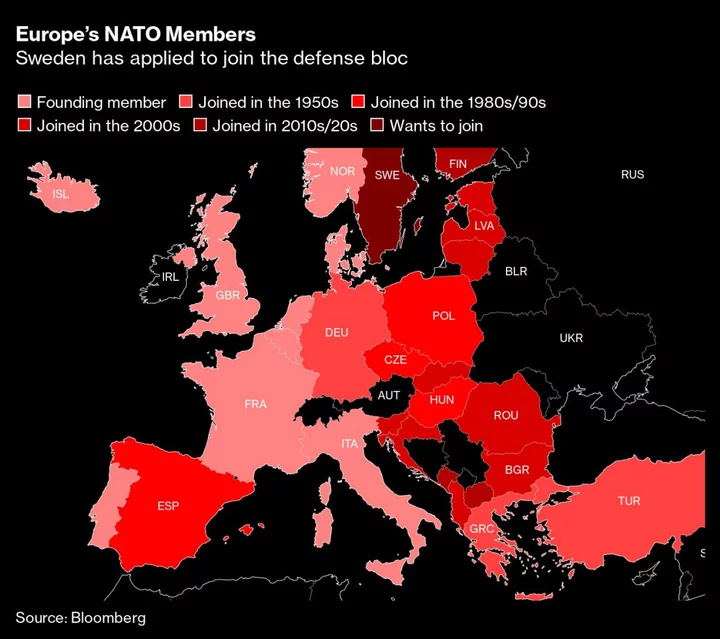Sweden is hoping its plans to become the 32nd member of NATO will get back on track on Thursday when its strictest terror laws to date enter into force.
The legislation, which will make participation in any terrorist group punishable by law, could provide the necessary impetus needed for reelected Turkish President Recep Tayyip Erdogan to approve the Nordic nation’s accession to the North Atlantic Treaty Organization.
A lack of action against Kurdish terrorists is widely seen as a key reason for Turkey’s refusal to allow the Nordic country into the defense alliance. In Sweden’s view, the new legal measures will satisfy its last remaining obligation under an agreement signed last year to pave the way for ratification.
“We have fulfilled what we committed to do and hence, it is also time for Turkey to start its ratification process and keep its part of the deal,” Sweden’s foreign minister Tobias Billstrom said in an interview last week in Stockholm. “Sweden has delivered on all parts of the memorandum.”
Russia’s invasion of Ukraine in February 2021 continues to redraw the security landscape in Europe. Neighboring Finland joined the alliance in April even though the two countries had initially agreed to work on the accession process in lock-step. Should Sweden become a member, NATO’s expansion would encompass the whole Nordic region, with the alliance controlling much of the Baltic Sea that is a strategic gateway for Russia.
Read More: How Russia Pushed Finland and Sweden Toward NATO: QuickTake
All but two of NATO’s 31 members have ratified Sweden’s application, and Billstrom’s government remains optimistic that it could get the needed approvals from Turkey and Hungary by the NATO summit to be held in Vilnius in mid-July.
However, with Erdogan focused on forming a new cabinet, that may be practically difficult. While a declaration of intent to approve Sweden’s bid could be an option, Billstrom insisted that his ambition is to have the formal clearance when NATO leaders meet in the Lithuanian capital.
“Me and the entire government will work for full membership in NATO all the way until Vilnius,” Billstrom said. “If there is no ratification before Vilnius it could take weeks or even months, until the Turkish parliament reopens after summer.”
Turkey, on its part, has signaled that it will want to be able to assess the implementation of the new terrorism act before committing to ratification.
The law caps off efforts that got underway in 2017, after an Uzbek man hijacked a beer truck and plowed through Stockholm’s main pedestrian shopping street, killing five people. Laws have been gradually tightened since then, but banning participation took longer as it required altering freedom-of-association clauses in the nation’s constitution. The measure passed parliament with a wide majority in May, despite criticism from the country’s Council of Legislation, a legal watchdog.
While the new law doesn’t specifically target the Kurdish PKK group that Turkey is most concerned about, it will allow better cross-border cooperation to contain the threat from terrorists of various stripes, according to Hans Ihrman, deputy Chief Prosecutor at the national security unit. He is now preparing terrorism-financing charges against an alleged supporter of the group. The prosecution, which would be the first of its kind, involves a Turkish citizen who allegedly sought to extort money at a Stockholm restaurant.
The case became public early in February, only a week after Erdogan had ruled out supporting Sweden’s NATO application following an incident in which a Danish far-right activist, Rasmus Paludan, burned a translated copy of the Koran near Turkey’s embassy in Stockholm.
The legal measures still won’t assuage Ankara’s demands for a ban on expressions of support for Kurdish groups, however.
Erdogan’s communications chief Fahrettin Altun on Tuesday lashed out at Swedish authorities for an incident where a group of PKK sympathizers projected an image of the group’s flag onto the walls of Sweden’s parliament to promote an anti-NATO protest the coming weekend. Sweden “must prevent PKK members from demonstrating,” Altun said in a tweet, adding that it is “completely unacceptable that PKK terrorists continue to operate freely in Sweden.”
In response to Altun’s tweet, Billstrom said that he would prefer to focus on what the two countries have agreed on, and that the new terror law is “the clearest sign” that Sweden takes Turkey’s legitimate concerns seriously.
“We have been willing to — within the limits set by our legislation and constitution — do what has been required of us,” the foreign minister told reporters in Lulea, Sweden. “We believe that we have delivered, and so Turkey should also deliver and start the ratification process.”
While the application may not be the first item on the agenda for Erdogan’s new cabinet, the diplomatic and legislative efforts are likely to bear fruit in the end, according to former Prime Minister Carl Bildt.
“If it turns out that it becomes a long-term issue, it is definitely troublesome, but I don’t see any reason to believe it will be,” Bildt said.
--With assistance from Zoe Schneeweiss and Jillian Deutsch.

